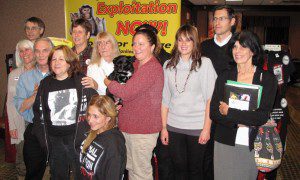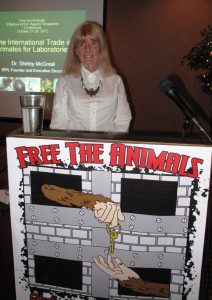Free the Animals 2012

“Ask not what primates can do for you, ask what you can do for primates.”
Shirley tweaked a classic line from President Kennedy in her main presentation on the primate trade at an animal rights conference in Saint Louis, Missouri, last weekend.
[field name = “shirleys-saen-presentation-re-trade”]
The “Free the Animals” conference in the American Heartland was small and welcomed participants from a variety of small animal protection groups. Featured presentations balanced case histories (Shirley’s talk of the Nepal monkey export ban, this year’s Green Hill lab beagle victory in Italy) with how-to’s (strategy development, online research tools, media management) and facts-on-the-ground reports (the crisis of primate sanctuaries, birds as the hidden victims of experimentation).

The conference speakers—a small but select group.
This was a rather impromptu conference. About three months ago, Michael Budkie realized that relatively little had been said about animals in labs at a national animal protection conference held in Washington, DC, this past summer. Michael (the director of Stop Animal Exploitation Now!) and his team quickly put together a program that focused on this crucial aspect of animal advocacy.

Shirley’s presentations–a talk about the primate trade and a panel discussion about effective alliances–were well received.
Michael gave a nice shout-out to Shirley during his introduction of her. When he was getting started in animal activism, he said, he was interested in digging up documents about what really goes on in animal labs. Shirley was one of the first people to show him some of the tricks of the trade.
Perhaps the most inspirational talk was given by Tino Verducci, who reported on a massive beagle rescue. The Green Hill facility (it’s a subsidiary of the U.S. lab animal breeder Marshall Farms but located in Montichiari, Italy) once bred beagles for biomedical use but was coming under increasing public and official pressure after allegations of animal cruelty and irregularities in its business practices.
[field name = “green-hill-beagle-rescues”]
What did the public pressure look like? Over a period of many months, there were a number of massive demonstrations. Just this past June, for instance, there were 10,000 people marching in protest in Rome and another 3,000 in the town of Montichiari itself. At one point the public even approached the grounds of the Green Hill facility and helped with handing puppies out through the barbed wire fencing. In all, 2,639 beagles were freed and adopted out. The facility is now empty.
Imagine re-homing the world’s lab primates—or better yet, keeping them free in nature!

